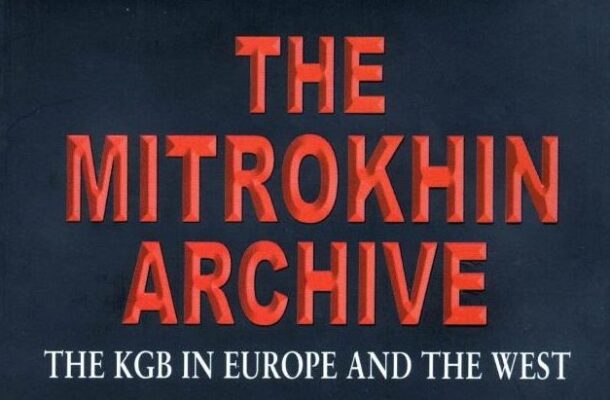Reopening the Mitrokhin archive

Tuesday 23 January marked 20 years since the passing away, in British exile, of an unpretentious archivist—and one of the most remarkable and consequential figures in international espionage—Vasili Mitrokhin.
A KGB officer for more than three decades, Mitrokhin’s defection to the UK in 1992, masterminded by the Secret Intelligence Service, delivered an extensive personal archive of hand-written notes made of KGB documents accessed before his retirement. The process was aided by his responsibility for transferring First Chief Directorate [foreign intelligence] records from central Moscow to a new headquarters, between 1972 and 1982.
Mitrokhin’s defection was acknowledged in 1999 upon publication of the first of two books co-authored with historian Christopher Andrew. Reaction to the audacity of Mitrokhin’s enterprise and to the archive’s contents was rhapsodic. Former KGB general Oleg Kalugin:
When I opened Mitrokhin’s book for the first time, I was stunned by the accuracy of his descriptions of many intelligence operations I had been personally involved in… Mitrokhin’s book has become for me an encyclopaedia of sorts, a true treasure trove of information about the cold war times.
The FBI called the archive: ‘the most complete and extensive intelligence ever received from any source’. The CIA described it as ‘the biggest CI (counter-intelligence) bonanza of the post-war period’.
After an inquiry, the UK Parliament’s Intelligence & Security Committee concluded that Mitrokhin:
‘[i]s a man of remarkable commitment and courage, who risked imprisonment or death in his determination that the truth should be told about the real nature of the KGB and their activities, which he believed were betraying the interests of his own country and people. He succeeded in this, and we wish to record formally our admiration for his achievement.’
But beyond initial surprise, and sheer volume of records, why was Mitrokhin important? Why remember this humble archivist?
In one sense the answer’s obvious. Mitrokhin revealed the extraordinary extent to, and confirmed the egregious nature of, Soviet intelligence operations and interference globally during the Cold War.
Rather immediately, this led to identification of historical KGB spies in the US and UK. Melita Norwood (codename HOLA)—who betrayed British nuclear secrets and was memorialised in newspaper headline as ‘the spy who came in from the coop’—is well known. A more pressing example, sparking successful prosecution, was former National Security Agency (NSA) officer Robert Lipka.
It also served to underscore the appalling behaviour of the KGB and its antecedents (mirrored by its successors!)—characterised by violence, cynicism and a contempt for truth. Just a few examples from Volume I (aka The Sword and the Shield) suffice:
- Soviet navy defector Nicholas Shadrin’s disappearance in Austria in 1975 confirmed as a botched kidnapping resulting in Shadrin’s death;
- A plot to break defector ballet dancer Rudolf Nureyev’s legs (euphemistically termed ‘lessening his professional skills’);
- Sabotage plots (and arms caches) ready in the event of war with the West;
- Supplying of weapons to terrorist groups; and,
- Widespread ‘active measures’ (covert influence and interference) globally—including instigating many of the conspiracy theories plaguing us today.
Volume I focussed on KGB activities in the West. Volume II (The World was going our way, published after Mitrokhin’s death) catalogued activities in Africa, Latin America and Asia.
As Andrew observed, revelations of pervasive KGB operations and influence (hitherto underexamined) served to balance what was until then a ‘curiously lop-sided history of the secret Cold War in the developing world’ given no account of US policy would be prepared without an accompanying (critical) examination of the CIA. Ironically, in 1974 the KGB documented over 250 of its own ‘active measures’ just targeting the CIA’s reputation in the developing world.
To take a handful of regional examples:
- An extraordinary level of KGB activity in India, including active measures attempting to convince Indira Ghandi she was the imminent victim of a US-sponsored coup;
- Coerced recruitment and blackmailing of two Japanese Foreign Ministry officials (RENGO and EMMA) in the late 1960s and 1970s; and,
- Significant Line X (scientific and technological intelligence) operations against Japanese industry. Stolen Japanese technology benefited approximately 100 Soviet R&D projects in 1980.
Mitrokhin’s revelations also reverberated in Australia. As it happened, he visited as part of a KGB escort team during the Melbourne Olympics. This was the high point of Mitrokhin’s operational career but in the wash-up he was shunted from operations and into administration (and archival work that had been his pre-KGB training).
But Mitrokhin’s revelations published in 1999 and 2005 did not include specific material about Australia. Subsequent availability of his notebooks in 2014 did include some such information but there has long been speculation that other material remains unreleased.
Nonetheless, revelations reported included:
- The 1963 Skripov expulsion had initially crippled operations in Australia, requiring complete rebuild of operational capability;
- Operations directed at and through Australian universities—Leonid Stupin (GATSKY), a Soviet academic at ANU, and a Melbourne-based professor codenamed SILVER (thought to be Reginald Bray);
- Archbishop Aghan Baliozian OAM (Armenian Church), who arrived in Australia in 1975 was a KGB spy (having been recruited in 1973 although later discontinued for under-performance); and,
- Labor MP Albert James was a confidential contact of (now infamous) KGB officer Gerontiy Lazovik.
Australia was indeed ‘a medium-high target’ for the KGB, as it was seen (quoting ASIO’s official history) as a ‘backdoor route into the secrets of the US, the so called “main adversary”, and Britain’. Furthermore, Mitrokhin refuted the assertion of Anatoli Golitsyn, 1960s Soviet defector, that ASIO had not been penetrated. In fact, reports suggest the KGB had penetrated ASIO.
Beyond his revelations, Mitrokhin’s story highlights the West’s continuing potential advantage over authoritarian foes. For Mitrokhin was motivated in his archival collection and defection by a snowballing of outrages and crises: Nikita Khrushchev’s secret speech denouncing Stalin’s crimes, the Prague Spring’s crushing, and the decrepitude of late Soviet life (and moral counter example of dissidents)—and by comparison with the West’s ideals.
This still matters today. As then Australian Secret Intelligence Service (ASIS) Director-General Paul Symon argued in 2022:
‘ASIS benefits from espionage opportunities that emerge from the suppressed dissent within authoritarian states. When leaders abolish fixed political terms, for example, they become responsible and accountable for everything – including the disillusionment that emerges from within. This provides us an edge. We notice that in closed societies top officials will always reinforce leaders’ biases and assumptions. That, after all, is the safest career path for them. Speaking truth to power is an enduring strength of our system.’
This article was published by The Strategist.
Dr Chris Taylor is a research consultant. He was formally a research fellow at the Melbourne Sustainable Society Institute and a researcher with the Faculty of Veterinary and Agricultural Sciences. His work focuses on Australian forest management.














